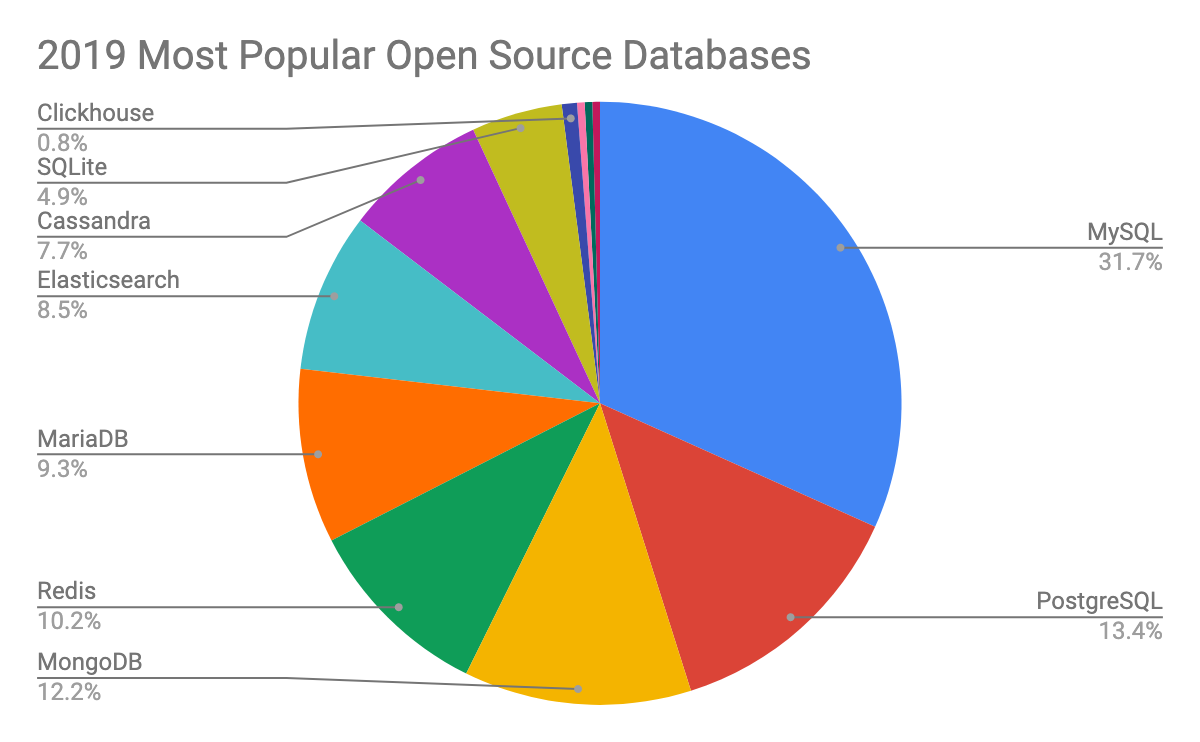| Percona's DBMS Popularity Survey |
| Written by Nikos Vaggalis | |||
| Tuesday, 25 June 2019 | |||
|
Open Source vs. Commercial, Public Cloud vs. On-Premise vs. Hybrid Cloud? Which one? Last month ScaleGrid attended Percona's Live event, got the insight on the most used "databases" by Percona's clients in 2019 and made a report out of it.
I'll ignore the fact that the report mistakenly uses the term "database" in place of (R)DBMS, so that I can just focus on the juicy stuff. The popularity categories are broken down into:
So first of all, the lowdown on the top Open Source "Databases". MySQL is still the undisputed champion representing over 30% of the market. PostgreSQL came second with 13.4%, while MongoDB, Redis and MariaDB, in that order, complete the group of the top 5. It is worth noting that 3 out of the 5 are RDBMS products, while 2 are NoSQL, which goes to show that the relational model is still going strong despite its old age.
The report finds that top commercial databases used with open source "databases". This actually means, the commercial products are mostly used side by side with open source ones, or are caught in the middle of jumping ship towards a counterpart that is open source. Unsurprisingly, PostgreSQL is the open source DBMS that most businesses are migrating to. Oracle, holding a whooping 66%, is the most popular commercial offering used together with an open source one. Number 2 spot is occupied by SQL Server with 22.2% and number 3 by DB2 with 11%. Here the report rightly highlights the huge gap between the popularity of Oracle and SQL Server. So I have to ask, isn't the porting of SQL Server to Linux paying dividends yet? The next category is most interesting because it is about a strong dilemma many business find themselves in, that of having to choose between Public, On-Premises, or the Hybrid cloud for their operation. On the On-premise front, PostgreSQL holds the crown with the 55.8% percent of the total deployments, followed by MongoDB with 52.2%, Cassandra with 51.9%, and MySQL with 50% As far as the public cloud goes, the winner is SQLite with 43.8% and Redis second. On the Hybrid cloud environment, Elasticsearch comes first. The rest of report holds some interesting stats on the most popular Cloud providers for Open Source Database Hosting; Polyglot persistence aka using different databases to handle different needs, and SQL vs. NoSQL open source database popularity. I think that the key findings of the report are that SQL products still dominate, despite NoSQL's hype, but the type and brand of the DBMS used varies a lot depending on the infrastructure. Also that more and more businesses have their sights on the open source offerings, to the point of considering jumping ship.
More Information2019 Open Source Database Report: Top Databases, Public Cloud vs. On-Premise, Polyglot Persistence
Related ArticlesThe Enduring Influence Of Postgres Connecting To The Outside World with Perl and Database Events Google's Cloud Spanner To Settle the Relational vs NoSQL Debate? SQL Server on Linux, Love or Calculated Move? Pro SQL Server On Linux (Book Review)
To be informed about new articles on I Programmer, sign up for our weekly newsletter, subscribe to the RSS feed and follow us on Facebook or Linkedin.
Comments
or email your comment to: comments@i-programmer.info |
|||
| Last Updated ( Tuesday, 25 June 2019 ) |



